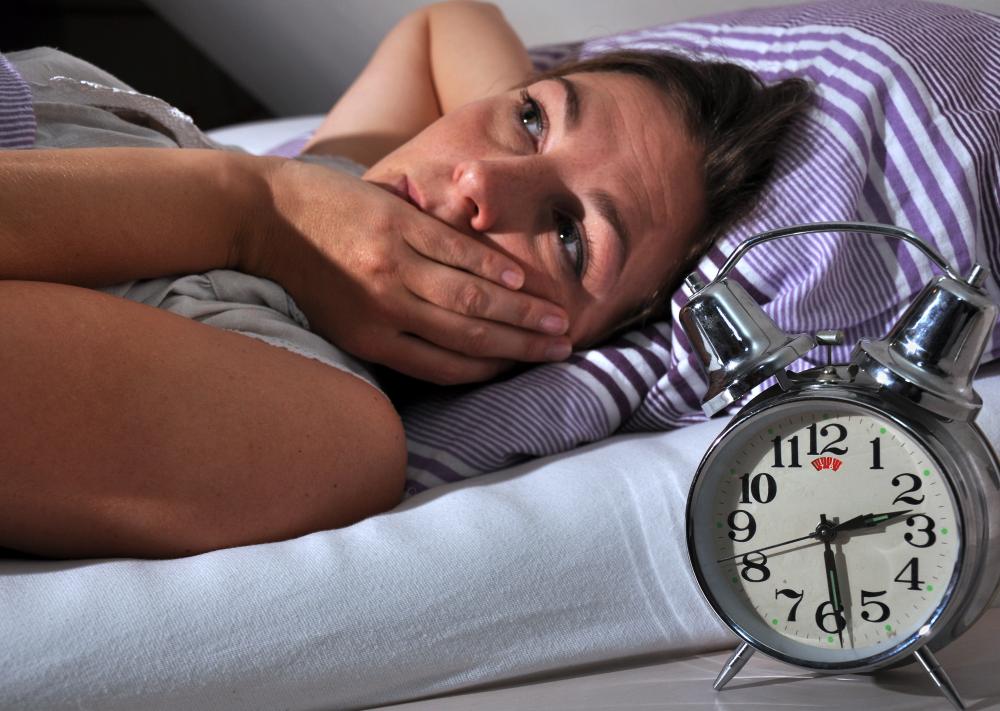At WiseGEEK, we're committed to delivering accurate, trustworthy information. Our expert-authored content is rigorously fact-checked and sourced from credible authorities. Discover how we uphold the highest standards in providing you with reliable knowledge.
What is Parasomnia?
A disorder that disrupts sleep can be called a parasomnia. These are usually classed as primary or secondary depending upon their type. A primary parasomnia is one that arises out of the sleep state and could said to be caused by sleeping. These include things like night terrors, nightmares, vivid dreams, and sleepwalking. Secondary parasomnias occur when the body’s other actions disrupt sleep. A person who has indigestion might be kept awake by it, or someone with issues with frequent urination may need to use the bathroom so frequently they’re unable to get adequate sleep. In both types, sleep is affected and parasomnias may result in poor sleep, insomnia, or merely tiredness the day afterwards.
Most people will have the occasional vivid dream or a nightmare that is so frightening it wakes them up in the middle of the night. They’re technically not supposed to wake to full consciousness at this time, but a nightmare could be so scary, it creates a physical response, like a rise in blood pressure and heart rhythm. This can disturb the sleep cycle a person is in, and bring them fully awake. Some people have vivid dreams from which they don’t wake, but they might disturb others by talking, moving, or kicking and punching out. These actions may change sleep cycle, and result in less restful sleep for the person.

Night terrors are a very different parasomnia than are vivid dreams or nightmares. During these, people appear to be awake, but they usually cannot be comforted and seem to be extremely terrified. They usually won’t remember anything about having moved, screamed or talked in the night, though they can do all of these. Many young children go through an episode of night terrors, and some adults continue to suffer from this parasomnia. It does mean the person is technically awake, but they can’t be roused from their terrified state.

Sometimes a parasomnia may be classified as an arousal disorder. These can mean people seem capable of doing complex things like walking around or “sleepwalking,” or they can eat, talk, or get up and pull the sheets off a bed. This state is a strange one, because the person does seem awake, but they’re also fully unaware of what they’re doing. There have been some accounts, though these are very rare, of people driving in this state, associated with taking certain medications designed for sleep, or of people overeating in the middle of the night. Most times, arousal disorders are not this drastic, but they can be dangerous to the sleeper, or make it impossible for other people in the house to rest.

Given the variety of parasomnia types, it would be difficulty to discuss treatment in specifics. Things like night terrors in young children are usually not treated because they tend to resolve on their own. In adults, people might undergo sleep studies, and they might take medications or have a combination of counseling and medication to help treat persistent night terrors. Nightmares, too, unless they occur on a frequent basis, may not require treatment. Parasomnia that involves significant movement when a person is a semi-conscious state do require mediation in many cases, because of the chance that a person will be injured when they perform actions while asleep.
AS FEATURED ON:
AS FEATURED ON:















Discussion Comments
I dream all night while I am sleeping, then I wake up in the morning so tired as if I did not sleep.
If I have a vivid dream, and occasionally talk in sleep, I do not like to be awaken. Usually I wake up on my own. I have a strange sense for a short time as if part of the brain is sleeping and dreaming while the other part is hearing the sound of somebody waking me. It is not pleasant, as if the sleeping part does not want to, or is not ready to awaken.
Now some people like to be awaken, and their dreams interupted. Maybe staying in the dream is more difficult than being awaken.
Post your comments